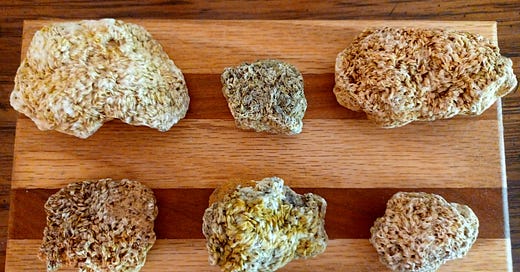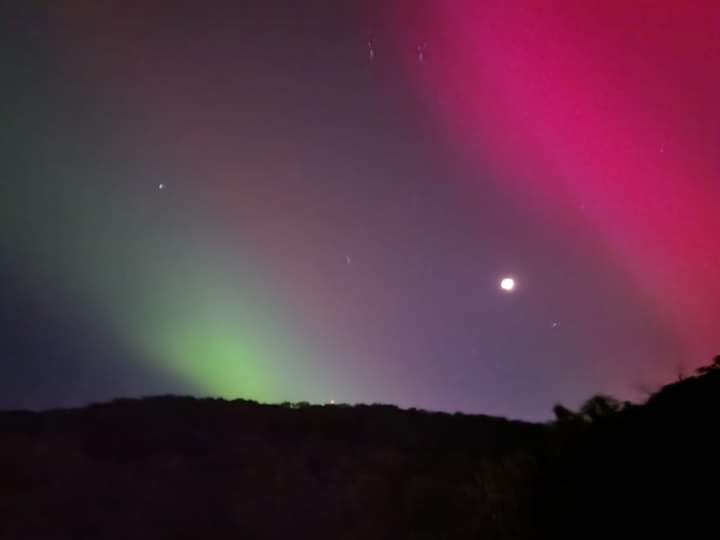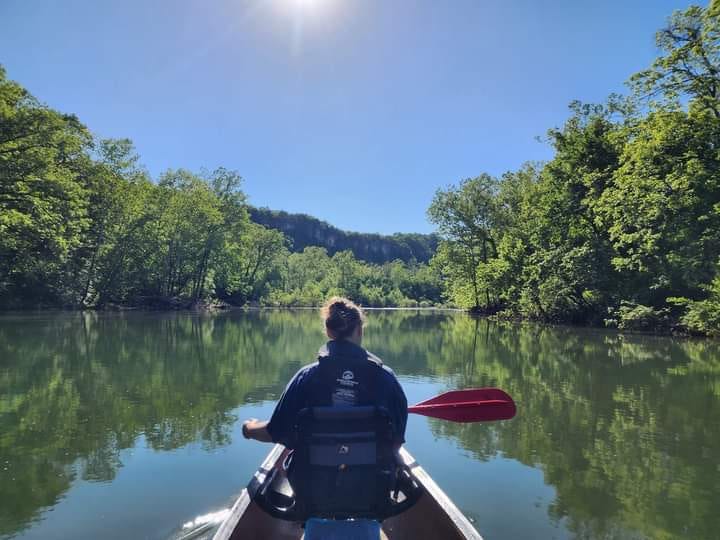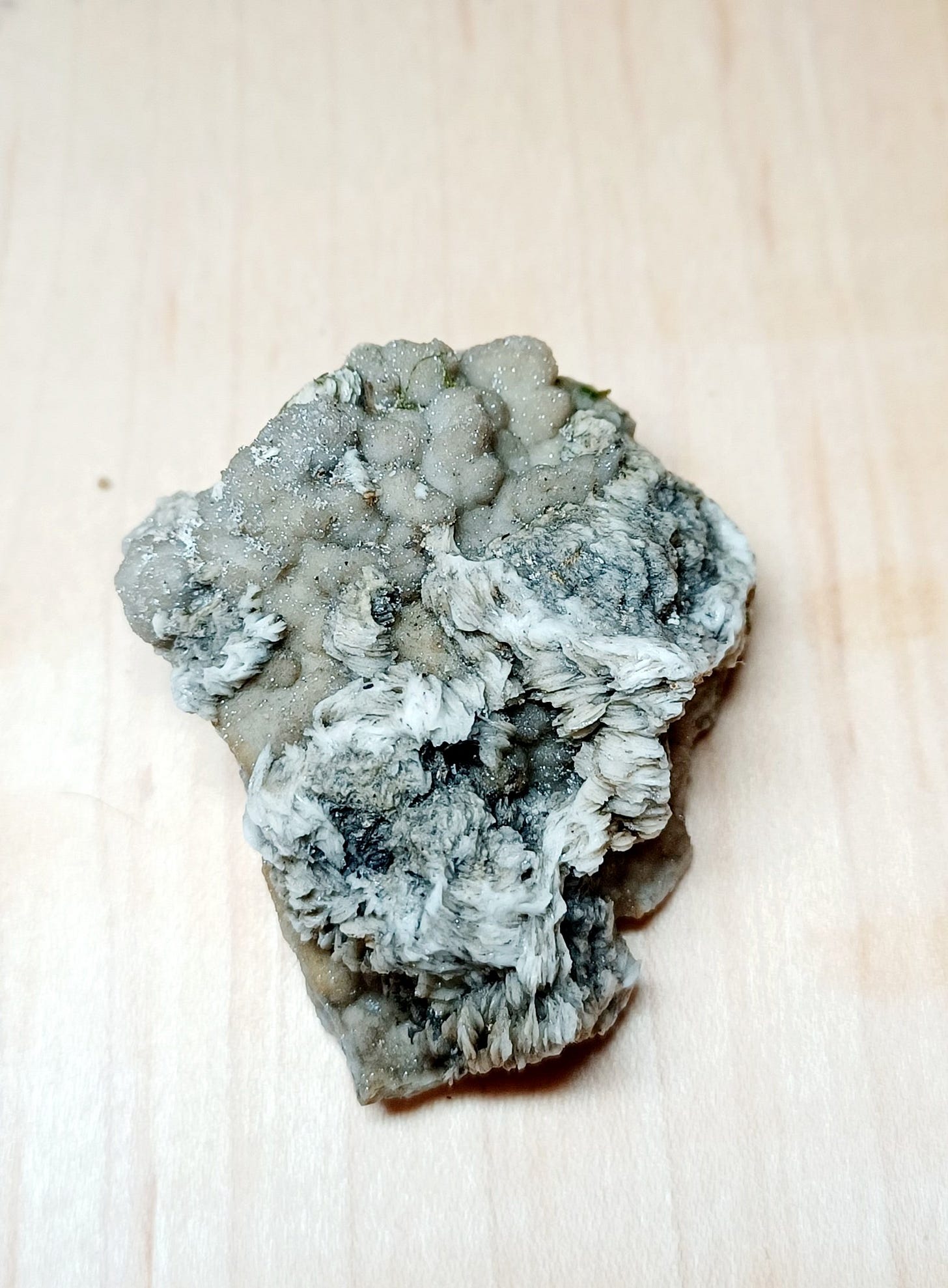On May 10, I saw the northern lights in southern Missouri.
I didn’t know they were coming. I was on a river sandbar looking for the Milky Way. It was early, so my husband and I were counting stars. It is easy to see stars in a place with no people.
A white streak emerged, wider than a strobe and more defined than a galaxy. Maybe it’s a UFO, I thought, but remembered Ozarks-bound aliens prefer the stretch west of Joplin.
The phantom white turned fluorescent green, then as dark as a fairy tale forest. More streaks followed like chalk dust on a blackboard. Then the white turned pink and the pink turned purple and the whole sky was so full of color that we nearly missed the shooting star that burst through the waning black like an exclamation point.
The aurora borealis filled the night like a memory. We had seen it before, twenty years ago in Iceland, when we were young and expected light in the dark. Now we were old, and the sun had exploded.
I had heard of solar flares, but I didn’t base our trip around their consequences. We were canoeing that weekend because we knew the river would be high and the cicadas would be low, still in their seventeen-year hibernation. That same logic had brought us to southeast Missouri for four minutes of totality during the solar eclipse. We watched from a spot near the sycamores, because early April is also morel season. I plan my life around nature’s rhythms, tracing the patterns, waiting for the payoff.
But the northern lights left me surprised. Pleasantly surprised — a sensation so rare in 2024, it took me a while to recognize it.
I don’t know how long we stayed out sky-gazing. Our phones had no service. We were off the grid, but we hadn’t yet set out on the river. We could still find internet if we tried. I felt an urge to share what I saw — and to verify it. We drove to a place with WiFi so I could check that these really were the northern lights, and to see if others had witnessed them too.
On Twitter, people posted photos from all over the world: The UK, Ohio, Canada, Germany, Texas. For once, my timeline was united in beauty instead of pain.
Scientists posted warnings that the solar storms causing the northern lights were severe. They had the potential to knock out electricity, internet access, and cell service.
“How will we know if the grid goes down?” I asked my husband. He shrugged. The next morning, we were going to float a river in a remote area that has never had cell or GPS service. Life there would proceed the same as always, no matter what happened.
“Find out on Sunday, I guess,” he said. That’s when we would drive home to St. Louis and reenter the grid.
I never look forward to that, but I appreciated the element of suspense this time round.
* * *
One of my favorite things to do on a canoe trip is look at rocks. River rocks are different than the ones I find in abandoned mines, which tend to be large and heavy: druzy quartz and agate bands covered with dirt and ore, fragile galena and barite waiting to be unearthed.
My hobby is paying Missouri farmers to let me dig for rocks on their lead belt properties. Assuming I survive — my husband has pulled me out of shallow shafts a few times — I take a few buckets home. I spend months cleaning the rocks with a toothbrush and chemical concoctions until their truest form is revealed.
Why, what do you do for fun? Go out and talk to people?
Gravel bar rocks are special because hardly anyone has seen them. They move with the river, and mutate with it, and exist in places where no one lives. I pick up gravel bar rocks but rarely pocket them, because they’re too good for me. They’re not down and dirty like druzy quartz, which is an underground rock, a rock needing rescue and care. Gravel bar rocks are self-sufficient, so I leave them be.
But I did pick up an ammonite fossil, so well-preserved it looked fake. I put it in our dry bag. It reminded me that Missouri was an ocean, long ago.
Maybe it will be an ocean again, I thought, thinking how within a one-month span I had seen the sun blotted out of the sky and then the residue of its explosion light up my night. It felt like anything was possible, in the best and worst of ways.
The river was rough due to tornados and floods pounding the region all year. Normally I appreciate a strong current — Missouri rivers tend to move like the slow slurred speech of a drunk — but we were dodging debris and riding rapids for sixteen miles. The few people we encountered all helped each other, warning of downed trees and hidden boulders. They helped people drag their canoes to safer passage and right them when they tipped.
I liked the people I met on the river because they were real. And I knew that once I reentered the grid, they wouldn’t be.
* * *
The same month that the sun erupted, Google unveiled a search service called AI Overviews. As many have observed, what gets marketed as “artificial intelligence” is plagiarism: scraped off bits of real people’s ideas, devoid of context or credit.
Google’s AI Overview is worse, though. It seems set on killing you.
“How many rocks should I eat each day?” people asked Google. AI Overview responded that people should eat at least one small rock per day because they contain healthy vitamins and nutrients. The source was an Onion article, but AI cannot discern satire.
The AI search results went viral, along with others telling people to put glue on pizza and to jump off the Golden Gate Bridge if they’re suicidal. Google tried to remedy the automated response to the rock question. But if you modified it to “how many rocks should a child eat each day?” AI continued to recommend a steady diet of pebbles.
AI terrifies me more than anything I find in the wild lands that people derisively refer to as “Deliverance territory”. AI is costing my friends their jobs and eating my books and destroying the public domain. When it exposes itself as idiotic, I am briefly relieved. But I know it will return, because the technocrats who control it don’t care what human beings want.
Ten years ago, if you sought to investigate a topic, the problem was too much information: endless free websites and archives and discussion boards and search results that reflected the keywords you entered, and not the whims of a manufactured hive mind.
Now the problem is the opposite: paywalled facts and free-floating lies, contorted into paragraphs composed by robots indifferent to death.
Rocks feel comforting because they’re something I can still dig up, unlike the truth. They have been here for billions of years and have outlasted every lie. They are full of secrets, but they are natural secrets, ones that you discover with patience and care.
On Etsy — another site destroyed by the enshittification of the internet — the same kind of crystals I find can sell for a hundred dollars apiece, because local hucksters have decreed that they have magical qualities. Selling hokum to the witless is one of Missouri’s oldest traditions, dating to the days of Twain. I won’t stand in the way of tall tale entrepreneurs, even though my own haul has not granted me the psychic gifts they promise. It’s hard enough to make a living in Missouri.
But I do wonder whether the combination of bullshit and automation means the next time I do a search on Missouri geology, an AI robot will tell me to scarf down some quartz and wait for my witch powers to activate.
As the internet is demolished, my most reliable sources have become out-of-print books. This includes my favorite book on local geology — Thomas R. Beveridge’s Geologic Wonders and Curiosities of Missouri — and the book that best explains the current political nightmare of Israel, Robert I. Friedman’s The False Prophet: From FBI Informant to Knesset Member, a 1990 expose on the terrorist Meir Kahane and his vision of an Israeli government that resembles the current one in membership and criminal deeds.
Both books are on the Internet Archive, but that archive is increasingly not working either.
We are losing information. We are losing our collective mind, and it is being replaced with a contrived one. The contrived collective is run by oligarchs and steals your money and your faith. It doesn’t feel coincidental that this is happening in a time of genocide and global kleptocracy.
We are not supposed to know why so many atrocities are converging at once. We are not supposed to know the backstory of the villains. We are not supposed to know the history of the victims. We are not supposed to know who to blame. We are supposed to accept the inhuman — in all its forms.
They want us to trust the machines and eat the rocks.
* * *
On Sunday, I re-entered the grid and learned the world did not end. The sun blew up and the Earth orbited it anyway.
When I used to picture the grid, I pictured a cube. I did not know why until I realized I was envisioning a prison. And that when I imagined being off the grid, I pictured blank space, emptiness where I could move in any direction without anyone knowing. The bars on my phone are the bars of my cage.
When I float a river, I don’t bring my phone. They say it’s risky to do this, but if there are no bars, what does it matter? You’re already free.
I’d float away forever if it were not for obligation: to my children, to my readers, to my country and its victims. The world needs more witnesses that we can confirm are human. We need people with compassion to catalogue the crimes. The price people pay for caring is often measured in personal safety. That is what it costs to stay human inside a surveillance state.
It is a grim place, the grid. Sometimes I feel like something beyond us knows this and throws cosmic miracles our way to keep us going. A ring of fire in a midday night; northern lights in southern Missouri.
Or the raw miracle of crystals unearthed, shimmering in the sun for the first time, because you cared enough to dig until they were free.
Thank you for reading! This newsletter is free because I do not believe in paywalls in times of peril. But if you like my writing, please consider a paid subscription! That is how I pay my bills and keep the newsletter going.
Note to subscribers: I am working on edits of my new book, THE LAST AMERICAN ROAD TRIP, and may not update as frequently over the next few weeks. But I will be back with articles regularly once the edits are done! Thank you for your patience.
Barite clusters I found in an abandoned mine in a Missouri ghost town. Yum!
The northern lights in southern Missouri.
Off the grid.
Barite on druzy quartz.








I love how whenever anyone likes this post, I get an email notification that says “[Name] liked eating rocks.” Keep enjoying those rocks everyone! ;)
Other than because I have been very fortunate in financial matters, I subscribe to make sure I do not miss nuggets like “Eating Rocks”
I do think that many of Ms Kendzior’s fans do enjoy being off the grid for a while, such as the walks my wife and I take along the shores of Maine.
I am often challenged to understand her writings and always love the phrasing ,vocabulary and imagery . But today I knew , or thought I knew, that Sarah made up a great word:”enshittification”. Then I learned it was the 2023 word of the year with a meaning of “systematic decline in quality of online platforms driven by greed”.
Never before have a seen a 4 letter word with prefixes and suffixes with a perfect meaning . I still think Sarah created the word